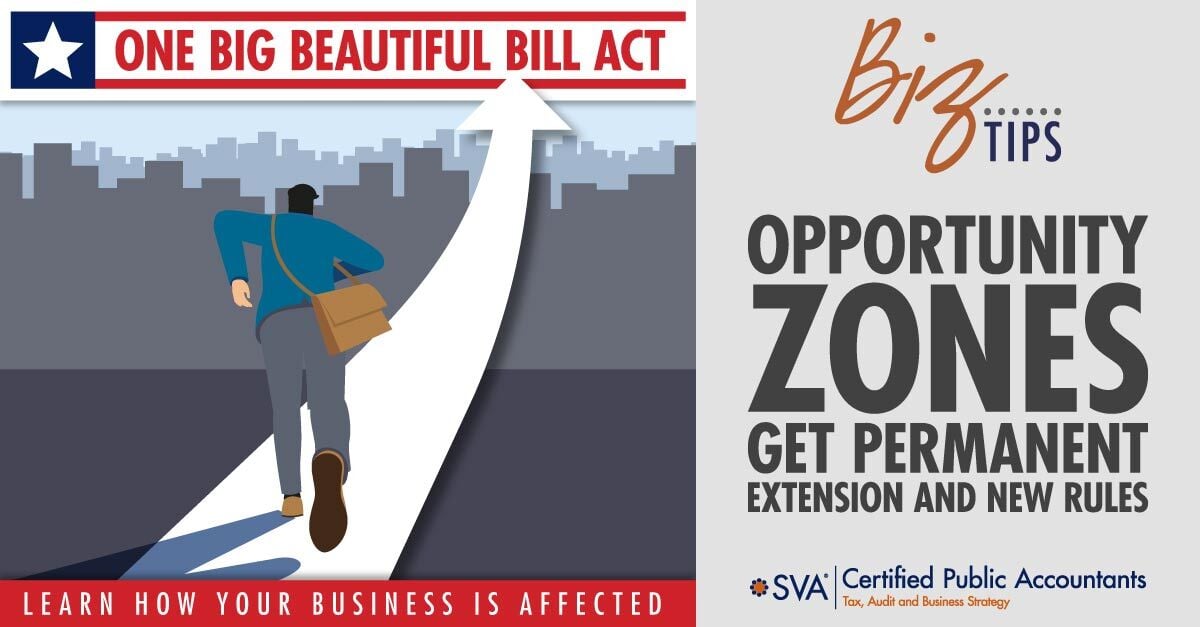| Highlights: |
- Summarizes the permanent extension of the Qualified Opportunity Zone (QOZ) tax incentive program under the One Big Beautiful Bill Act (OBBBA) and updates to its structure.
- Reviews original Opportunity Zone benefits like capital gain deferral, step-up in basis, and post-investment gain exclusion under the Tax Cuts and Jobs Act.
- Explains new rules for investments after 2026, including a rolling five-year deferral, revised step-up basis rules, and enhanced incentives for rural zones.
- Notes tightened eligibility standards for zones, increased reporting and compliance requirements, and planning considerations for timing investments before and after the rule changes.
|
The Qualified Opportunity Zone (QOZ) program just got a permanent extension under the One Big Beautiful Bill Act (OBBBA).
This move brings much-needed certainty to investors and developers who have used the program to reduce capital gains and invest in underserved communities. There are also new enhancements for rural zones and tighter standards to qualify going forward.
Here’s a breakdown of what the rules were, what’s changed, and what business owners and investors should know now.
(Download Video Transcript)
A Quick Refresher on the Original QOZ Program
Created under the Tax Cuts and Jobs Act (TCJA) of 2017, the QOZ program gave investors three key benefits:
1. Capital Gain Deferral
If you reinvested a capital gain into a Qualified Opportunity Fund (QOF), you could defer tax on that gain until the earlier of the date you sold your QOF investment or December 31, 2026.
2. Step-Up in Basis
Holding periods brought added benefits:
- 10% of the deferred gain was excluded if held for 5 years
- An additional 5% (for a total of 15%) if held for 7 years
3. Exclusion of Post-Investment Gains
Hold your QOF investment for 10-plus years, and all appreciation becomes tax-free.
This program was set to sunset at the end of 2026, creating a wave of investment activity ahead of that deadline.
What's Changing Under the OBBBA
The OBBBA permanently extends the Opportunity Zone program and introduces a few key changes for new investments starting in 2027:
Capital Gain Deferral Still Exists
The deferral now lasts up to five years, or until the investment is sold, whichever comes first. That means the previous long runway to 2026 is replaced with a rolling 5-year clock from your investment date.
Step-Up in Basis Gets a Makeover
For new investments made after December 31, 2026, investors will receive a 10% step-up in basis after holding the investment for five years. The previous 5% step-up benefit that applied after seven years has been eliminated.
However, a new incentive targets rural-focused Opportunity Zones (areas with populations under 50,000), offering an enhanced 30% step-up in basis after five years, making these zones particularly attractive for long-term investors.
Post-Investment Gains Still Excluded, But With a Cap
As before, if an investment in a Qualified Opportunity Fund is held for more than 10 years, any appreciation on that investment can be excluded from taxable income. However, under the One Big Beautiful Bill Act, this benefit now comes with a limit: the tax-free growth period is capped at 30 years. After that point, any additional appreciation would be subject to taxation.
The Program is Now Permanent
With the removal of previous sunset dates, investors and communities no longer face a looming expiration, allowing for greater predictability and long-term planning. This permanence creates a more stable environment for economic development and investment strategies centered around Opportunity Zones.
Other Changes to Keep in Mind
The new version of the program adds stricter eligibility standards for areas that want to qualify as Opportunity Zones. Communities must meet tighter income and poverty thresholds, which could lead to a shift in which areas qualify in the future.
And for those involved in QOFs, there are increased reporting requirements and stronger penalties for failing to comply, so oversight is about to get more intense.
What Should Business Owners and Investors Do Now?
If you’re holding appreciated assets and looking to reduce your tax liability while investing in community development, this is still a compelling option, but timing matters.
- Any investment made before the end of 2026 will follow the old rules (including the 2026 deferral deadline). That could mean picking up the deferred gain in 2026 no matter what.
- If you can time your gain to occur in 2027 or later, you could benefit from a new five-year deferral window, offering more flexibility and time to plan.
- For investors interested in rural development, the new rural OZ fund structure adds enhanced benefits worth exploring further.
Because the census tracts for the new zones haven’t been published yet, some planning will need to wait. But if QOZ investing is on your radar, this is a good time to reconnect with your tax and legal advisors to discuss how future changes may fit into your overall strategy.
Looking Ahead: More Certainty, More Accountability
The permanent extension of the Opportunity Zone program brings stability to a popular tax incentive. While the updated rules reduce some benefits and increase compliance demands, they also aim to refocus the program on long-term, high-impact community investment, especially in rural areas.
© 2025 SVA Certified Public Accountants

